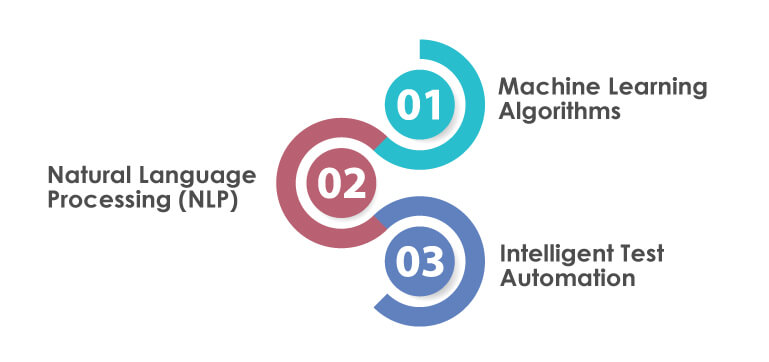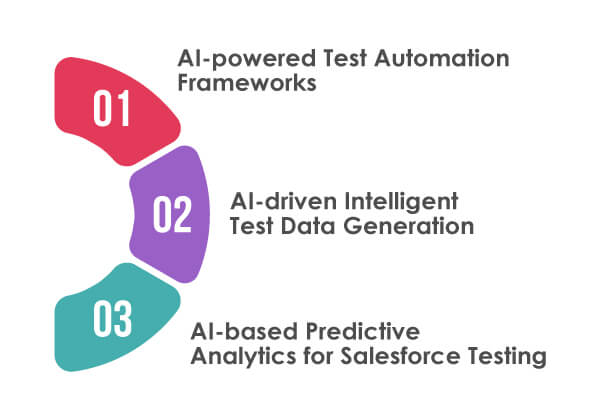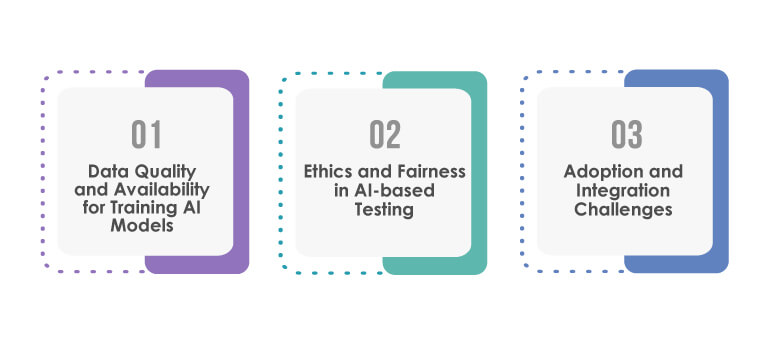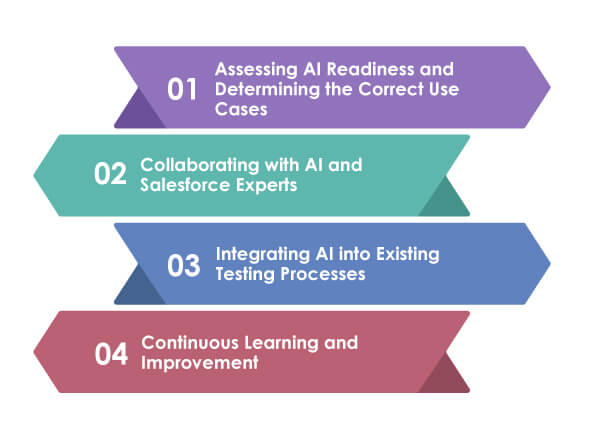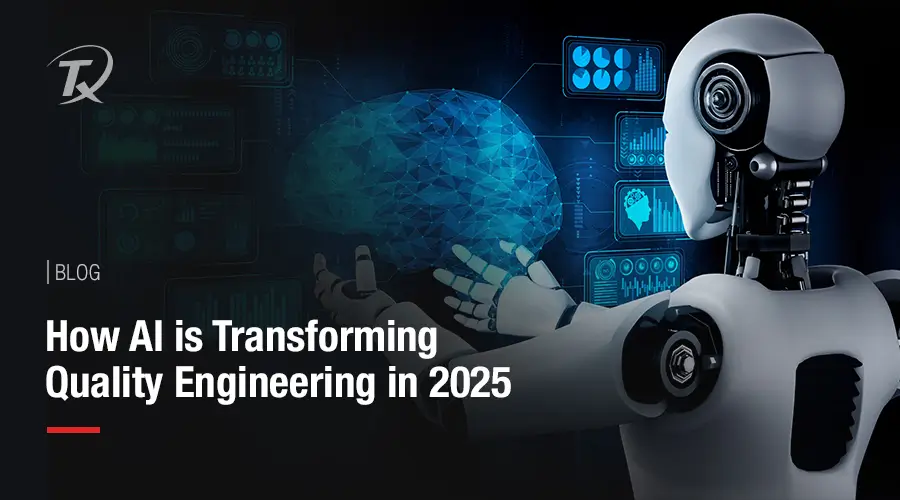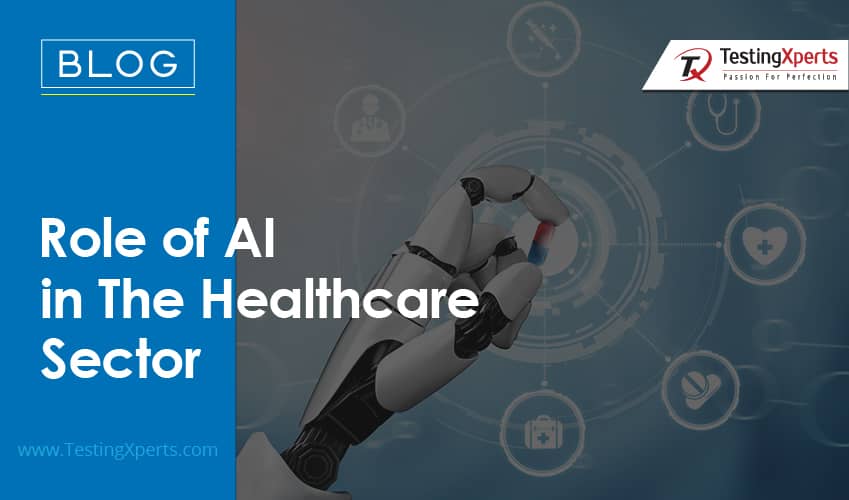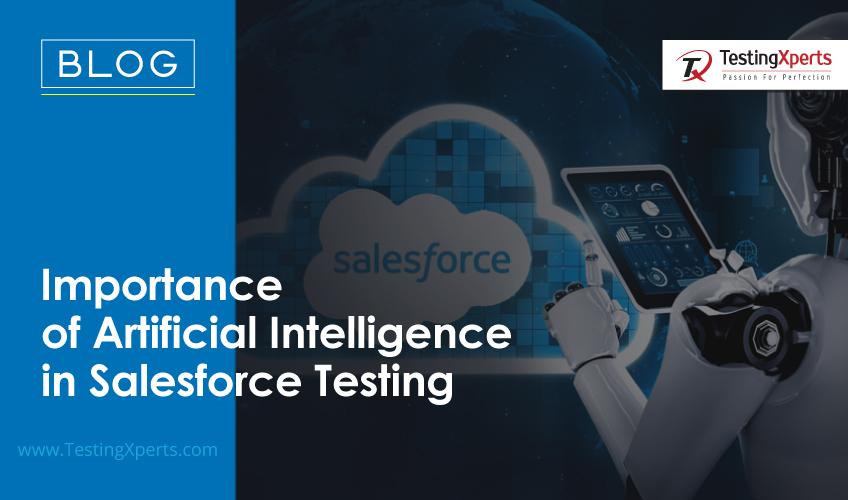
Content
1. Understanding Artificial Intelligence in Salesforce Testing
2. Benefits of Using Artificial Intelligence
3. Use Cases of AI in Salesforce Testing
4. Challenges & How to Overcome Them Using AI
5. Best Practices for Implementing Artificial Intelligence in Salesforce Testing
6. Conclusion
7. Why Partner with TestingXperts for Salesforce Testing Services?
Salesforce, a leading customer relationship management (CRM) platform, is widely adopted by organizations to manage their sales, marketing, and customer service operations. As Salesforce implementations become more complex and integrated, ensuring the reliability and functionality of these systems through effective testing becomes crucial. Salesforce testing is critical to ensuring the functionality and reliability of Salesforce implementations. However, traditional testing approaches often need help with time, effort, and accuracy. That is where Artificial Intelligence comes into play.
AI offers a powerful solution to overcome the limitations of traditional testing approaches in Salesforce testing. AI techniques can significantly enhance the testing process, improving efficiency, accuracy, and effectiveness.
Understanding Artificial Intelligence in Salesforce Testing
AI in Salesforce testing involves leveraging machine intelligence and automation techniques to improve testing efficiency, accuracy, and effectiveness. It includes various AI techniques and algorithms to analyze data, identify patterns, and make intelligent decisions.
AI techniques used in Salesforce testing are as follows:
Machine Learning Algorithms
Machine learning algorithms enable systems to learn patterns and make predictions based on historical data. In Salesforce testing, these algorithms can be trained to analyze large datasets, identify patterns, and predict potential issues. This enables proactive defect detection, reduces manual effort, and improves testing.
Natural Language Processing (NLP)
NLP techniques empower systems to understand and interpret human language. In Salesforce testing, NLP can analyze test requirements, user stories, and documentation. It helps automate test case generation, enables adequate test coverage, and enhances the overall efficiency of the testing process.
Intelligent Test Automation
Intelligent test automation combines AI and automation to enhance test case creation, execution, and maintenance. AI-powered automation frameworks can learn from user interactions, optimize test execution paths, and provide intelligent suggestions for creating robust test scenarios. This accelerates test execution and reduces testing cycles, enabling faster time-to-market.
Benefits of Using Artificial Intelligence
AI is the simulation of human intelligence in machines capable of performing tasks that typically require human intelligence. In Salesforce testing, AI can automate and enhance various testing processes, improving efficiency and accuracy.
Here’s why AI is necessary for Salesforce testing:
Increased Test Coverage:
Salesforce implementations typically involve complex business processes, integrations, and customization. Generating comprehensive test cases to cover all scenarios can be time-consuming and prone to human errors. AI techniques like machine learning algorithms can automatically analyze historical data, identify patterns, and generate test cases, ensuring higher test coverage.
Faster Test Execution:
Manual test execution is often time-consuming and resource intensive. AI-powered automation frameworks can execute tests significantly faster, accelerating the testing cycle. Organizations can quickly bring Salesforce implementations to market by reducing testing time and improving competitiveness and customer satisfaction.
Intelligent Bug Detection:
Identifying and resolving bugs is critical to Salesforce testing. AI techniques enable intelligent bug detection by analyzing testing data, identifying patterns, and detecting anomalies that might indicate potential issues. This proactive approach allows testers to identify and address bugs early in the development cycle, reducing the impact on end-users and minimizing costly rework.
Predictive Insights:
AI models can leverage historical testing data to provide predictive insights into system behavior and performance. By analyzing patterns and trends, AI can forecast potential issues or performance bottlenecks, allowing organizations to take preventive measures and optimize their Salesforce implementations. This proactive approach improves the overall stability and reliability of the system.
Enhanced User Experience:
Salesforce implementations aim to provide a seamless and intuitive user experience. AI in testing can simulate user interactions, identify usability issues, and provide valuable insights for improving the user interface. Organizations can enhance the user experience and increase customer satisfaction by addressing usability concerns early in testing.
Scalability and Efficiency:
Manual testing approaches become increasingly challenging to manage as Salesforce implementations grow in complexity and scale. AI techniques, such as intelligent test automation, can handle scalability requirements autonomously and generate and execute test cases. This automation saves time and effort and ensures consistent and repeatable testing processes.
Use Cases of AI in Salesforce Testing
The application of Artificial Intelligence in Salesforce testing has revolutionized how organizations validate the functionality and reliability of Salesforce applications. AI techniques offer various solutions to the challenges of testing complex Salesforce implementations. From AI-powered test automation frameworks to intelligent test data generation and predictive analytics, the following use cases demonstrate the transformative potential of AI in Salesforce testing. By understanding and leveraging these use cases, organizations can unlock the full power of AI to ensure the quality and success of their Salesforce applications.
AI-powered Test Automation Frameworks
AI can be leveraged to develop intelligent test automation frameworks to learn, adapt, and optimize test scenarios. These frameworks use machine learning algorithms to analyze test data and user interactions, enabling them to provide suggestions for creating robust test cases. They can also optimize test execution paths, prioritize high-risk areas, and identify redundant test cases. By automating repetitive tasks and optimizing test coverage, AI-powered test automation frameworks improve testing efficiency and accelerate the delivery of Salesforce applications.
AI-driven Intelligent Test Data Generation
Generating realistic and diverse test data for Salesforce applications is critical to testing. AI techniques can analyze the structure and patterns within the Salesforce data model to generate intelligent test data. By understanding the relationships between different data elements, AI algorithms can create representative test data sets that cover various scenarios and edge cases. This ensures comprehensive test coverage and helps uncover hidden defects that may not be apparent with limited or synthetic test data.
AI-based Predictive Analytics for Salesforce Testing
AI-powered predictive analytics can be applied to Salesforce testing to extract valuable insights from test data. AI algorithms can predict potential performance bottlenecks, security vulnerabilities, and system failures by analyzing patterns, trends, and historical data. These predictive insights enable proactive measures to address risks, optimize testing strategies, and make data-driven decisions. AI-based analytics also assist in identifying the root causes of defects, improving the efficiency of testing processes, and enhancing the overall quality of Salesforce applications.
Challenges & How to Overcome Them Using AI
Salesforce testing poses unique challenges due to the complexity and customization options offered by the platform. Some common challenges include handling large volumes of test data, ensuring seamless integration with external systems, managing frequent updates and releases, and addressing compatibility issues. The introduction of AI in Salesforce testing can help overcome these challenges and streamline the testing process.
Following are how organizations can overcome challenges associated with Salesforce testing with the help of AI models:
Data Quality and Availability for Training AI Models
The success of AI in Salesforce testing depends on the quality and availability of training data. Organizations must have clean, representative, and diverse data for training AI models and must consider data privacy and compliance to maintain the integrity and security of customer data.
Ethics and Fairness in AI-based Testing
When implementing AI in Salesforce testing, ethical considerations become crucial. AI algorithms should be trained and tested with fairness in mind to avoid bias and discrimination. Organizations should establish guidelines and policies to ensure responsible AI usage and mitigate unintended negative consequences.
Adoption and Integration Challenges
Integrating AI into existing testing processes requires careful planning and implementation. Organizations must assess their AI readiness, identify suitable use cases, and collaborate with AI and Salesforce experts. Clear communication and training are essential to ensure AI’s successful adoption and integration in Salesforce testing. The best option is to partner with Salesforce testing experts who utilize AI practices.
Best Practices for Implementing Artificial Intelligence in Salesforce Testing
Implementing Artificial Intelligence in Salesforce testing requires careful planning and execution to maximize its benefits. By following the below-mentioned practices, organizations can successfully integrate AI into their testing processes, enhance efficiency, and improve the overall quality of their Salesforce applications. These best practices will guide organizations towards effectively utilizing AI capabilities and integrating a successful AI-enabled Salesforce testing strategy:
Assessing AI Readiness and Determining the Correct Use Cases
Organizations should assess their readiness for AI adoption by evaluating their existing testing processes, data availability, and infrastructure. They should identify the areas where AI can bring the most significant value, such as test automation, test data generation, or predictive analytics. Starting with small pilot projects and gradually scaling up can help mitigate risks and ensure successful implementation.
Collaborating with AI and Salesforce Experts
Collaboration between AI experts and Salesforce testing experts is crucial for successful implementation. AI experts can provide insights into AI techniques, algorithms, and tools, while Salesforce experts can contribute their domain knowledge and understanding of the platform. This collaboration ensures that AI is applied effectively to address specific Salesforce testing challenges.
Integrating AI into Existing Testing Processes
AI should be integrated seamlessly into existing testing processes and tools to maximize its benefits. This integration may involve developing custom AI models, integrating AI-driven tools, or leveraging AI capabilities provided by Salesforce. Organizations should ensure that the AI integration does not disrupt existing workflows and aligns with their overall testing strategy.
Continuous Learning and Improvement
AI models and algorithms should be continuously monitored, evaluated, and improved to ensure their effectiveness and accuracy. Organizations should invest in ongoing training and upskilling of their testing teams to understand AI techniques, interpret AI-driven insights, and optimize testing processes. Continuous learning and improvement are crucial to harnessing the full potential of AI in Salesforce testing.
Conclusion
AI is necessary for Salesforce testing to overcome the limitations of traditional testing approaches. By leveraging AI techniques, organizations can achieve increased test coverage, faster test execution, intelligent bug detection, predictive insights, and enhanced user experiences. Organizations should carefully assess AI readiness, collaborate with experts, integrate AI into existing processes, and prioritize continuous learning and improvement. By following best practices and collaborating with AI and Salesforce experts, organizations can leverage the power of AI and shape the future of Salesforce testing.
Why Partner with TestingXperts for Salesforce Testing Services?
Partnering with a reliable, experienced provider like TestingXperts regarding Salesforce testing services can offer numerous advantages. With expertise in AI-driven testing, TestingXperts can effectively help organizations harness AI’s power in Salesforce testing.
Why Partner with Us?
Deep Expertise in AI and Salesforce Testing
Our team of skilled professionals combines extensive knowledge of AI techniques, algorithms, and tools with a profound understanding of the Salesforce platform. This unique combination allows us to develop tailored solutions that leverage AI to enhance your Salesforce testing processes.
AI-Driven Test Automation Frameworks
By leveraging machine learning algorithms and intelligent automation techniques, we create frameworks that can learn from existing test cases, adapt to changes in the Salesforce application, and provide self-healing capabilities. This results in faster test execution, reduced testing cycles, and increased test coverage, enabling you to accelerate your release cycles without compromising quality.
Intelligent Test Data Generation
Our AI-based intelligent test data generation techniques go beyond traditional methods, enabling diverse and realistic test data creation. By analyzing existing data and understanding the underlying data model, we generate test data that covers a wide range of scenarios, including edge cases and complex designs. This ensures thorough testing and helps uncover hidden issues, enhancing the reliability of your Salesforce applications.
Predictive Analytics for Proactive Testing
AI-based predictive analytics techniques analyze historical test data to identify patterns, trends, and potential risks. It allows us to predict the impact of system changes, identify high-risk areas, and optimize test coverage based on the likelihood of failure. By leveraging predictive analytics, we help businesses allocate testing resources effectively and focus on critical areas, reducing the probability of issues impacting your Salesforce applications in production.
Partner with us to transform your Salesforce testing efforts and deliver exceptional experiences to your customers. Contact us today to explore how we can upscale your Salesforce testing journey.
Discover more
Get in Touch
Stay Updated
Subscribe for more info


